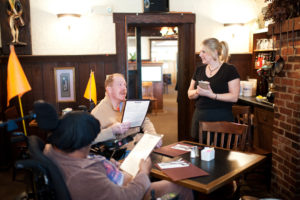 People who live in their own home in the surrounding community can participate in outpatient NeuroRehabilitation Therapies or Structured Day Programming, making it possible for a person to be productive while remaining living in their own home. Services may be provided either on a transitional basis or long term depending on the needs of the individual.
People who live in their own home in the surrounding community can participate in outpatient NeuroRehabilitation Therapies or Structured Day Programming, making it possible for a person to be productive while remaining living in their own home. Services may be provided either on a transitional basis or long term depending on the needs of the individual.
Outpatient services are individually determined through the initial pre-admission evaluation and a NeuroFunctional Evaluation. This evaluation conducted over a number of days or weeks, is conducted to establish projected outcomes, and recommendations for treatment to reach the projected outcomes. The focus is on the development of compensatory strategies with the intended outcome to be a productive daily activity pattern of the individual’s choosing.
Neurofunctional Evaluation
The following areas are assessed during the NeuroFunctional Evaluation:
- Skills to increase opportunities for community integration.
- Physical functioning
- Cognitive skills
- Communication skills
- Health and wellness to minimize effect of physical disorders like dysphagia
- Interpersonal skills and social relationships
- Vocational direction
- Educational needs
- Opportunities to participate in leisure and social activities in the community, including sexuality
- Spiritual and cultural needs
NeuroRehabilitation Therapies are then designed to meet the individual’s needs in terms of work, behavior, living skills, or community skills. These may include Cognitive Rehabilitation Therapy, Physical Therapy, Occupational Therapy, Speech-Language Therapy, or NeuroPsychology. Participation may be offered in the Brain Injury Clubhouse, InSPIRE, Transitional/Extended Employment, Volunteer Work, Supported Employment, or College work with Academic Coaching.


